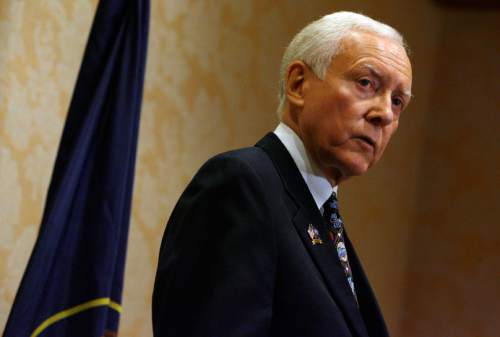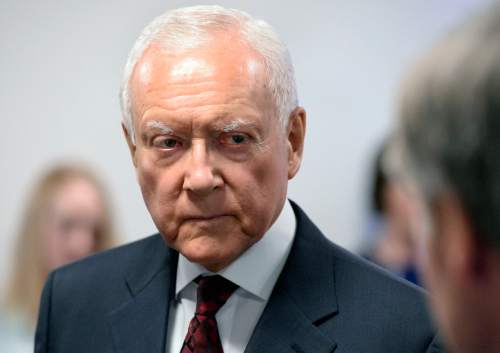This is an archived article that was published on sltrib.com in 2015, and information in the article may be outdated. It is provided only for personal research purposes and may not be reprinted.
Washington • The Senate advanced legislation Tuesday that would give the president expanded trade powers, a move pushed by Sens. Orrin Hatch, R-Utah, and Ron Wyden, D-Ore., to help pursue more agreements for American exports.
The bill barely cleared a 60-vote-threshold hurdle (60-37) but is expected to pass a final vote Wednesday on its way to President Barack Obama's desk.
Hatch and Wyden co-authored the bill that split Democrats in Congress between those who wanted to support Obama and others worried that new trade deals could hurt American workers. Some Republicans also balked at giving the president more authority.
Sen. Mike Lee, R-Utah, didn't vote and his office wouldn't say if he would have supported the measure.
Senate Majority Leader Mitch McConnell thanked Hatch and Wyden on the Senate floor — with Hatch seated right behind the GOP leader — for their bipartisan legislation that he says will "indicate that America is back in the trade business."
McConnell lavished praise on Hatch, the Senate Finance Committee chairman, saying America's trade agenda has been "safely guided by the steady and capable hands of Chairman Hatch.… I frankly can't see how we could have gotten Trade Promotion Authority through the Senate without him."
McConnell said, "He understands that tearing down international barriers to American-made products is key to growing our economy and the paychecks of American workers."
The legislation has the support of the administration and business organizations, who say it is necessary to win lower barriers to U.S.-made goods around the world.
But Sen. Sherrod Brown, an Ohio Democrat who led the fight against passage of TPA, warned that past global trade deals have resulted in large-scale loss of American jobs. "This is a day of celebration in the corporate suites," Brown said on the Senate floor.
Senate Minority Harry Reid, D-Nev., argued that in the 20 years since the passage of the North American Free Trade Agreement, there hasn't been any "compelling, concrete evidence" that it helped create American jobs or raise American wages.
"At a time when we as a country are struggling to enact policies that strengthen America's middle class, I do not believe that we should pass legislation that could hollow it out," Reid said.
The Trade Promotion Authority (TPA) allows the president to negotiate a trade deal with input from Congress but only allows an up-or-down vote on the deal once it's struck, a procedure meant to keep members of Congress from meddling with details after negotiations or delaying passage. The bill is one of several measures comprising Obama's second-term trade agenda as the administration works to finalize a 12-nation agreement among countries on both sides of the Pacific Ocean.
Another bill, to provide federal aid to workers who lose their jobs because of imports, is also awaiting approval. The rescue plan hatched last week calls for the Senate to pass that measure and the House to follow suit later this week, just before lawmakers begin a July 4 vacation.
The president's spokesman, Josh Earnest, hailed the vote, but said, "Our work on trade is not finished." He urged Congress to give the legislation final passage and also send the aid measure to the White House, but declined to say if the president will sign one bill if he doesn't get the other.
Eager to reassure Democrats who expressed doubt about a GOP commitment to pass the follow-up bill, House Speaker John Boehner, R-Ohio, issued a statement saying the House will vote on it "once it passes the Senate."
Hatch said the TPA legislation is a "victory for Utah," where one in five jobs relies on international trade.
"Utah has proven itself to be one of the best states in the country for business, and greater access to customers overseas is vital to our continued growth and economic success," Hatch said in a statement after the vote. "This bill provides the American people unprecedented transparency and a strong voice in establishing fair, responsible trade priorities that ensure that our economy continues to grow and our families continue to prosper."
Lee spokesman Conn Carroll said Lee was in Utah on Tuesday with his twin sons who had just returned from their two-year missions for The Church of Jesus Christ of Latter-day Saints. But Carroll said he couldn't comment on how Lee would have voted.
Brown, the Ohio Democrat, noted on the Senate floor that Lee had previously opposed advancing the legislation.
Lee's reluctance to declare how he would have voted could stem from conflicting outside pressures, on the right from forces opposed to giving Obama more authority and from the business community that wants the legislation.
"Senator Lee is between a political rock and a governmental hard place. Whichever way he votes he's going to irritate part of his political base in the middle of a political campaign," says Tim Chambliss, associate professor of political science at the University of Utah. "The voting public expects their senators to exercise good judgment on their behalf, in their absence and at their expense. The voters expect their senators to vote. That's why they're hired to vote on the tough issues."
The Associated Press contributed to this report.





